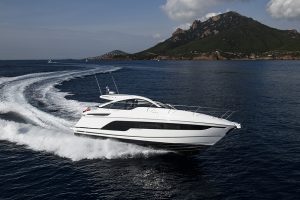Short hop and no police stop for MBM fleet
There is not a shorter leg anywhere on a Motor Boats Monthly Cruising Club itinerary than the micro hop from the modern marina facilities at Port Zelande to the traditional town basin at Brouwershaven.
Boats that made the journey direct yesterday (Sunday 6 August) barely logged two miles, some of that within the marina at one end and in the narrow approach channel to Brouwershaven at the other. Others chose a longer route around various of the islands at the western end of the Grevelingenmeer, anchoring off or stopping on the excellent range of pontoons that are provided in various locations.
It was, again, top weather for sailing boats with a stiff breeze out of the west clearing away rain clouds from the night before and providing anything with canvas a good excuse to get the bow wave sizzling. Given a speed limit of 15 kilometres per hour for anything under power (just over 8 knots), many motorboat rabbits were safely beaten by the tortoises as they made their way around the lake.
Whilst in Port Zelande our Tinker sailing RIB was put to good use. The marina has at least as much water area within its confines that is unpopulated as it has for moorings and we put this fact to good use, dicing with gusty and sometimes fluky winds but somehow managing to remain upright, much to the disappointment of observers.
Another busy boat was the waterjet-driven RIB belonging to the water police. We had reasons for wondering whether they would show an interest in us.
Last year we had encountered a police boat on the Veersemeer that expected all British boats to be registered on the Dutch system for fast craft over 20kph (10.8kn). We in turn had been acting on Royal Yachting Association advice for all such craft to wear their British Small Ships Register or Part 1 Register numbers at 6in (15cm) height on each side.
As our ships papers were revealed there was then also a question raised regarding the fact that our helmsman’s licences weren’t recognised, a problem that could have resulted in a fine and expulsion.
A civilised but ultimately lengthy exchange evolved to the point where it was discovered that:
a) there was a new agreement for the Dutch to have access to the British registers and hence, to accept British numbers but it had yet to be ratified;
b) the Dutch police had never heard of the International Certificate of Competence (ICC) and were looking for British skippers to produce the defunct Helmsman’s Overseas Certificate of Competence (HOCC).
Within 24 hours the police agreed that as a) was going to be agreed eventually, somewhere, they would let us proceed as was, rather than march 26 skippers into the post office at Goes for paperwork before then leaving them with the task of finding the nearest Blokker (the Dutch equivalent of Woolworths) in a vain attempt to buy numbers.
They also took a photocopy of this author’s ICC to circulate to all police departments around the Netherlands! As a consequence, whilst I have no tendency towards illegal activity (other than the criminal quality of my writing perhaps), I have a particularly strong incentive to behave whilst in the Netherlands.
Thus you now understand why my eye zeroed in on the police RIB this year. They were seen never closer than at a distance, checking several craft and rapidly tracking down a local RIB that was speeding outside of the waterskiing zone just off Port Zelande. But so far this trip they have left the British boats alone. That in turn is certainly helped by participants on our cruise who seem to have been careful about speed and wash this year.
One thing that the police and ourselves were quick to agree on last year was that no-one wanted trouble; they wanted us to visit the Netherlands and we wanted a good holiday here. Hopefully all the glitches have now been solved.








